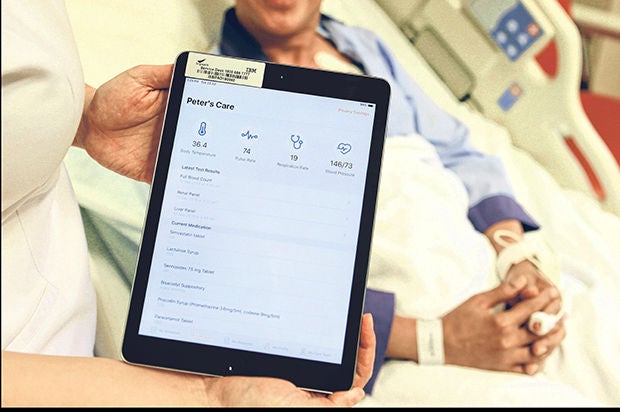
Patients in two wards in the Singapore General Hospital (SGH) have access to something more than a call button for their needs.
They can tap on the MyCare app installed on iPads that will be placed beside their beds.
The app allows patients to view their daily care schedules, including their meals, medication or tests throughout their hospital stay.
They can also access their medical information such as diagnosis, vital signs and test results.
The app also includes interactive features such as a messaging service for patients to ask nurses questions, request snacks, toileting assistance or other housekeeping services.
The initiative, announced yesterday in conjunction with SingHealth’s Nurses’ Day celebrations, is being piloted in the two wards comprising 51 beds at SGH, at no extra charge to patients.
Nurses’ Day falls on Aug 1. This year’s theme, The Future of Nursing, is centred on how technology, continual training and job redesigning would transform the way nurses provide care.
Professor Ivy Ng, group chief executive of SingHealth, said: “Digital technologies can improve the way we communicate information to patients and their caregivers, and empower them to be partners in their own care.”
But these technologies can never replace the personal and human touch of a nurse, said Adjunct Associate Professor Tracy Carol Ayre, group chief nurse of SingHealth.
Instead, these tech innovations save nurses time needed for certain routine but time-consuming processes, freeing them to do the essentials while still maintaining the human touch, she added.
Assistant nurse clinician at SGH, Ms Tan Sheng Lian, noted that the app has improved work processes between nurses and patients.
“Now, with the app, nurses can already know the patients’ requests on screen without needing to go to their bedsides, unlike when patients had to press call buttons.”
Besides the new app, a team of nurses in SGH is also piloting a wireless wearable biosensor that allows automatic and continuous monitoring of patients’ vital signs such as their heart rate, respiratory rate and skin temperature.
Ms Tan said that these are typically patients who have just undergone surgery or blood transfusions. Previously, nurses would need to do checks on them every two hours.
Each palm-size biosensor is adhesive, allowing it to be placed on the patient’s chest to collect data in real time.
It takes three minutes to set up the biosensor, which needs to be replaced only once every three days.
“Now nurses no longer need to disturb patients in their sleep to check their vital signs as they are already being monitored in real time,” said Ms Tan.
By 2021, SingHealth plans to roll out the MyCare app across its hospitals, which include Changi General Hospital, KK Women’s and Children’s Hospital and the National Heart Centre Singapore.
Contributed by














 Get it on Google Play
Get it on Google Play